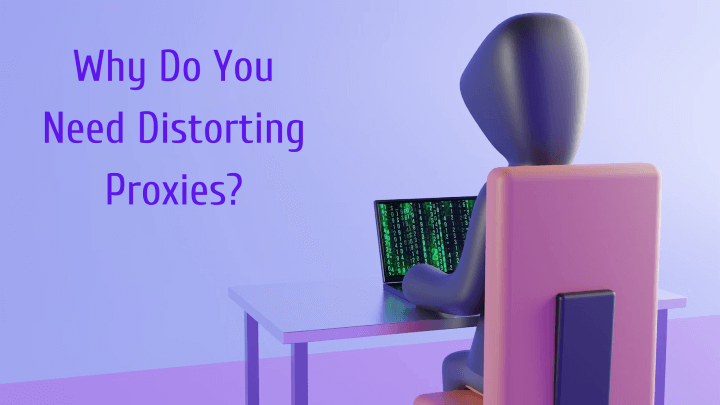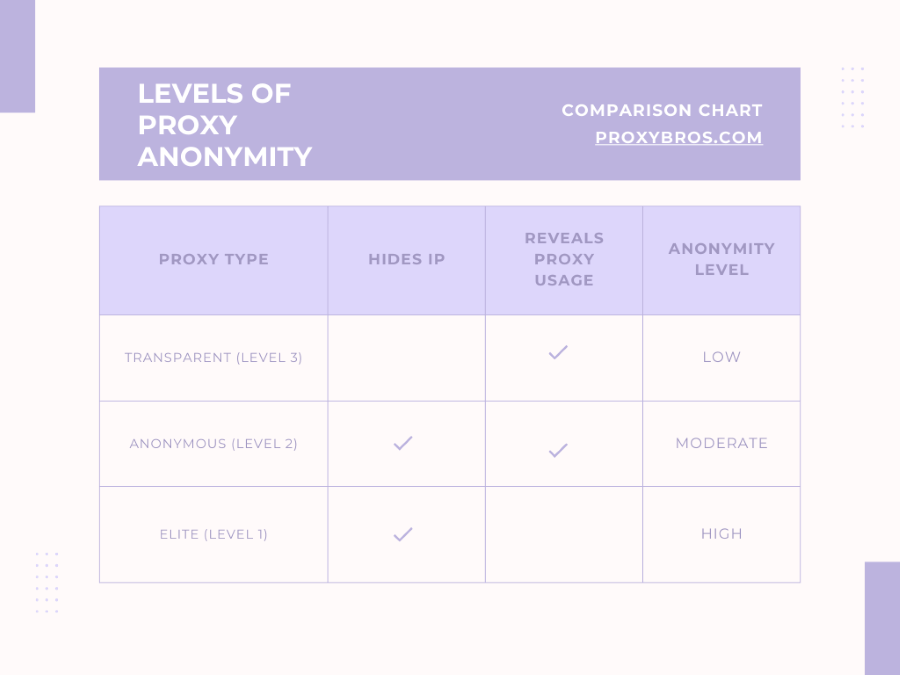All You Need to Know About Distorting Proxies

Navigating the digital realm is no less challenging than charting unknown waters. Our online presence, constantly under scrutiny, requires clever tactics to remain discreet. Enter distorting proxies, the unsung heroes of the cybersecurity world. These dynamic tools are adept at playing hide and seek with our IP addresses, making it a game-changer for online privacy.
Over a decade, I’ve been on a quest, testing and understanding countless proxies. The verdict? Grasping the nuances of distorting proxy services isn’t just beneficial — it’s essential in our data-driven age. They’re not mere tools but trusty sidekicks for those wanting an edge in online discretion. So, gear up, dear reader, as we embark on a journey to unravel the mysteries of distorting services, peppered with tales from my digital escapades. Onward we go!
Understanding the Levels of Proxy Anonymity
In the intricate world of proxies, understanding the levels of anonymity is akin to knowing the different gears in a car. Each group offers a distinct degree of privacy, and choosing the right one can significantly impact your online experience. Let’s delve into the various levels of proxy anonymity.
Transparent Proxies (Level 3)
As the name suggests, these proxies are entirely transparent about your identity. They forward your original IP address and don’t attempt to hide it. These are often used for content filtering in institutions or caching purposes. This type provides the lowest level of anonymity, which means websites can easily detect your real IP and know you’re using a proxy.
Anonymous Proxies (Level 2)
This type offers more privacy because it hides your original IP but reveals that a proxy is being used. Anonymous services are suitable for general browsing and tasks that require a moderate level of privacy. You should know websites won’t see your real IP but can detect proxy usage. By the way, it’s the group where distorting proxies also belong.
Elite Proxies (Level 1)
This is the crème de la crème of proxy anonymity. Elite proxies hide your original IP and mask the fact that they are used. They are ideal for tasks that demand the highest level of privacy, such as sensitive research or accessing geo-restricted content. With them, websites can’t detect your real IP or that you’re using a proxy.

The Basics of Distorting Proxies
While diving deep into cybersecurity, I discovered many tools and techniques to shield our online identities. Among them, distorting services stand out as a unique and intriguing one. Let’s unravel their mystery together.
At its core, a distorting proxy is like a master of disguise in the digital realm. It masks your actual IP address but with a twist. Instead of just hiding it, it cheekily replaces it with a false one, especially in the HTTP (HyperText Transfer Protocol) header. This clever trick creates an illusion, making websites believe you’re accessing them from an entirely different location than you are.
Now, how does this differ from other proxies? While many services simply act as middlemen, passing your requests to websites without revealing your IP, these services go a step further. They actively change or “distort” the IP information they send out.
The magic behind this distortion lies in the rerouting of internet traffic. When you, the user, send out a request to access a particular website, this request doesn’t go directly to its destination. Instead, it takes a detour, passing through the distorting proxy server. This server, acting like a digital chameleon, then changes the IP address details before sending the request onward. The result? The website sees the request coming from the proxy’s IP, not yours.
Over the years, I’ve tested numerous services and observed firsthand the benefits they offer, especially regarding online privacy. They’re convenient when accessing content restricted to specific geographical regions. But remember, while they provide anonymity, they’re not entirely foolproof. Combining them with other security measures is essential for a more robust defense.
Why Use a Distorting Proxy?
In my years of navigating the vast cyber realm, I’ve often been asked about the tools I swear by. One that consistently tops my list is the distorting proxy. Let’s explore why this service is a must-have in your online toolkit.
1. Enhancing Online Privacy 👀
The primary function of this proxy is to assign you a false IP, acting as a cloak of invisibility in the digital world. It significantly boosts your privacy levels, ensuring your online footprints are harder to trace. Over the years, I’ve realized that protecting one’s digital identity is paramount in an age where data is the new gold. And distorting services are like that trusty lock on your treasure chest.
2. Bypassing Geo-restrictions 🗺️
Have you ever been frustrated by that annoying “This content is unavailable in your region” message? I’ve been there too. Distorting proxy services are your ticket to a borderless internet. By rerouting your traffic through servers in different locations, they trick websites into thinking you’re accessing from a permitted region. Whether it’s streaming your favorite show or accessing region-specific research, distorting proxies have got you covered.
3. Protection Against Targeted Cyberattacks ⚡
While a place of endless possibilities, the internet is also rife with threats. Malicious attackers, hackers, and cybercriminals are always on the prowl. Thus, proxy services add an extra layer of defense by masking your real IP and presenting a false one. In my experience, this can be a game-changer, especially when accessing unfamiliar or potentially risky websites.
4. Web Scraping and Data Collection 🗂️
I’ve found distorting services invaluable for web scraping in my extensive testing. They allow for efficient data collection from various sources without getting blocked. By presenting different IP addresses, they reduce the chances of hitting rate limits or being identified as a scraper.
5. Caching for Faster Web Browsing 🚅
Some services have caching capabilities. It means they store frequently accessed web pages, allowing users to load them faster on subsequent visits.
Why Are Distorting Proxies Unique?
The world of proxies is vast and varied. Luckily, I’ve had the privilege of testing and exploring many services, and I’ve often been asked, “What sets distorting proxies apart from the rest?” Let’s clarify.
Their primary distinguishing feature is how they handle the IP address information in the HTTP headers. Let’s delve into this unique characteristic.
- What It Does: Unlike other proxies that either forward your original IP address (like transparent proxies) or hide it without revealing that a proxy (like elite proxies), distorting services take a different approach. They mask your actual IP address and replace it with a false one in the HTTP headers. So, while websites can detect a proxy, they receive incorrect information about the user’s location.
- Why It’s Unique: This method of “distortion” gives these proxies their name. It’s a middle ground between transparency and complete anonymity. It can be advantageous when you want to access content with geo-restrictions but don’t necessarily need to hide that you’re using a proxy.
✔️ Practical Application
Imagine you’re a market researcher based in the United States, working on a project to analyze the pricing strategies of e-commerce websites in Japan. You want to access a popular Japanese online store to gather data on product prices, promotions, and special offers available exclusively to Japanese customers.
However, when you try to access the website from the U.S., you’re either presented with international prices (which might differ from local prices) or redirected to the global version of the site, missing out on Japan-specific promotions.
It is where a distorting proxy comes into play. When using one, the Japanese e-commerce website might detect that you’re using the technology, but it will believe you’re accessing the site from within Japan due to the proxy’s false IP address. As a result, you’ll be able to view the website as a local Japanese visitor would, allowing you to gather accurate data on local pricing and promotions.
The Double-Edged Sword of Distorting Proxies
In the intricate web of the digital realm, distorting services emerge as both saviors and tricksters. So, it’s essential to know the potential storms they might bring. Let’s embark on a balanced journey, weighing the pros and cons of these digital navigators.
Pros
- Improved online research for marketers and businesses. Throughout my career, I’ve witnessed businesses leverage distorting services to gain unparalleled insights into global markets. They can peek into localized content, advertisements, and pricing by mimicking access from diverse regions.
- Enhanced security and privacy for users. Distorting services are a digital veil, obscuring users from potential online threats. By showcasing a deceptive IP, they ensure your genuine online footprint remains hidden. It has always given me an added sense of security.
- Bypassing Digital Barriers. A significant perk I’ve relished is the ability to sidestep geo-blocks. Distorting services have been my digital skeleton key, be it a European journal or an Asian-exclusive series.
Cons
- Potential for misuse. As they can be used for legitimate purposes, these services can be exploited for malicious activities, casting a shadow on their overall reputation.
- Not a complete anonymity solution. While they do mask your IP, other digital breadcrumbs like cookies or browser fingerprints can still reveal your identity.
- Reliability concerns. Especially with free proxies, there’s always a risk of intermittent connections, slow speeds, or even exposure to malware.
Common Mistakes and Misconceptions

While distorting proxy services offer many benefits, there are pitfalls that users, both seasoned and new, can fall into. Over the years, I’ve seen and made some of these mistakes myself. Let’s lighten them and ensure you’re on the right path.
1. Overestimating the Level of Anonymity
Distorting services are fantastic at masking your IP but aren’t all mighty. Some believe that using a distorting service makes them completely untraceable online. In truth, while they provide a significant level of anonymity, other factors, like cookies and browser fingerprints, can still give away your identity. Remember, it’s always a combination of tools and practices that ensures maximum online privacy.
2. Risks of Using Free or Untrusted Distorting Proxies
Who doesn’t love free stuff? But in the world of proxies, ‘free’ can sometimes come at a hidden cost. I’ve tested numerous free distorting services, and while some were decent, others were riddled with ads, slow speeds, or even security vulnerabilities. Additionally, using an untrusted proxy can expose you to risks like data theft or malware. So, you must do your homework and choose reputable providers.
3. Importance of Encryption and Secure Connections
While distorting services are great at altering your IP, encryption is what ensures your data remains unreadable. So what can you do then? Always ensure that the proxy you’re using supports secure protocols like HTTPS or additionally use VPNs. In my experience, a service without encryption is like a fortress with wide open gates.
Exploring Alternatives
While distorting proxy services have carved a niche in the digital realm, they aren’t the only tools in the shed. Over my years of exploration, I’ve encountered several alternatives that offer functionalities akin to the services in question. Let’s delve into some of them:
| Functionality | Use Case | |
| VPN (Virtual Private Network) | VPNs encrypt your internet connection, ensuring that all your online activities are private and secure. They mask your IP address and route your traffic through servers in different locations. | The technology is ideal for those seeking comprehensive online privacy, especially when accessing public Wi-Fi networks. |
| Rotating Proxies | These proxies automatically switch between different IP addresses at specified intervals. They’re perfect for tasks that require multiple IP addresses, like web scraping. | Best suited for large-scale operations, especially when scraping e-commerce websites or conducting extensive online research. |
| Sticky Proxies | Unlike rotating proxies, sticky services retain the same IP address for longer. This consistency can be beneficial for tasks that need a stable connection. | Ideal for online shopping from a specific region or light social media activities. |
| Tor (The Onion Router) | Tor routes your traffic through multiple volunteer-operated servers, making it extremely difficult to trace back to the original user. It offers a high degree of anonymity. | Suitable for users who prioritize anonymity and wish to access the deep web securely. |
Practical Recommendations
Ah, the realm of distorting proxy services! It’s vast, intriguing, and filled with potential pitfalls. But fear not, for I’ve traversed this landscape many times and gathered some wisdom. Here are my top recommendations to ensure you sail smoothly:
- Choose reputable proxy providers. Over the years, I’ve tested many providers, and trust me, not all are created equal. Going for providers with a solid reputation and positive user reviews is essential. Remember, a good provider is like a reliable co-pilot, guiding you safely through the digital skies.
- Combine proxies with VPNs and other security tools. Think of your online security as a multi-layered cake. While distorting services provide one layer of protection, combining them with VPNs adds another layer, enhancing your overall security posture. It’s a strategy I’ve employed repeatedly, and it’s served me well.
- Regularly update and rotate proxies. The digital world is ever-evolving. So, to stay ahead, it’s crucial to keep things fresh. Regularly updating and rotating your proxies ensures you’re not leaving any digital footprints behind. It’s like changing disguises in a spy movie, always keeping the adversaries guessing.
To Conclude
As we wrap up our dive into the world of distorting proxies, it’s clear that these digital tools are more than just IP maskers; they’re essential navigational aids in the vast ocean of the internet.
Over the years, I’ve come to appreciate their value, not just for the anonymity they offer but for the broader sense of security and freedom they provide. But, like any tool, their effectiveness lies in how we use them.
Always prioritize your online safety, choose reputable providers, and stay informed. The digital seas can be turbulent, but you’re well-equipped to chart a safe and informed course with distorting proxy services as your compass.
